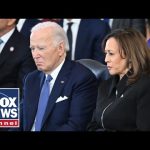The ongoing saga between President Trump and the Associated Press is quickly morphing into the stuff of political legend. On one hand, you have the Associated Press, a 179-year-old institution that seemingly believes it can waltz into press briefings unchallenged. On the other hand, you have Trump, holding court from his Mar-a-Lago throne, shaking things up in a way only he can. The stakes? Rethinking the Gulf of Mexico and how far the First Amendment can stretch.
Trump’s title challenge to the media’s longstanding title of “king” is certainly a move worthy of a political title fight. The latest spat revolves around the terminology for the body of water famously known as the Gulf of Mexico. Trump insists on calling it the “Gulf of America,” citing a newfound desire for patriotic nomenclature that just might ruffle some journalistic feathers. Meanwhile, the AP stands obstinately firm, clinging to its established language like a toddler refusing to give up their favorite toy.
Associated Press vs. Trump in ultimate showdown for media supremacyhttps://t.co/I6zCZ74KLR pic.twitter.com/EpM0bjxehO
— The Washington Times (@WashTimes) February 20, 2025
In a rather dramatic twist, the White House has pushed back by cutting off the AP’s access to certain press events, particularly those in the hallowed halls of Air Force One and the Oval Office. This sort of exclusion is reminiscent of a VIP club where not everyone gets to lounge on the plush sofas. The AP’s defenders are crying foul, arguing that such moves infringe on the First Amendment rights. But who knew that press access could be so contentious—or such a playground for political power plays?
Opinions are divided among legal scholars as to who holds the upper hand in this battle. Some analysts argue that presidents have the prerogative to choose their press pool, similar to a high school prom committee defining who gets to attend. In contrast, others caution against allowing political bias to dictate press access, emphasizing that public officials should be held accountable for their decisions. The ambiguity around First Amendment protections could turn this murky water into a legal whirlpool.
While the AP maintains that its adherence to historical naming conventions preserves clarity for its global audience, there’s a hint that this is more than just a mere naming convention. The backdrop of Trump’s presidency has been riddled with tension between the media and the administration. Previous administrations—looking at you, Obama—also had their fair share of squabbles with news outlets, trying to fence off certain journalists they deemed unworthy. So, the gamble Trump is taking appears to be playing a dangerously familiar game, one where the outcome of legality and fairness teeters on the brink of interpretation.
In the end, one thing is for certain: the media are going to have to step up their game if they expect to dance with this President. After all, Trump seems keen on making it crystal clear that nothing is sacred anymore, not even the Gulf of Mexico. With the stakes raised and the battle lines drawn, the fight between Trump and the AP will undoubtedly be a lesson in media relations no one will forget anytime soon.




